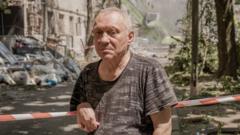As European dynamics shift, leaders Macron and Meloni prepare for a crucial meeting to discuss shared challenges, aiming to bridge their ideological divide to address pressing issues like the Ukraine conflict and international trade.
### Unlikely Allies: Macron and Meloni Pursue Cooperation Amidst Tensions

### Unlikely Allies: Macron and Meloni Pursue Cooperation Amidst Tensions
**In a changing European landscape, French President Macron and Italian Prime Minister Meloni seek common ground despite their contrasting political ideologies.**
In an unusual alignment of interests, French President Emmanuel Macron and Italian Prime Minister Giorgia Meloni, known for their contrasting political backgrounds, are scheduled to meet in Rome this week. Although their previous interactions have been marked by criticism and skepticism, this meeting represents a budding effort to foster unity among European leaders facing unprecedented global challenges.
Macron, aligned with a globalist and technocratic outlook, and Meloni, representing a nationalist and right-wing stance, display a mutual commitment to finding common ground on urgent matters, including the ongoing war in Ukraine and relations with the United States amid fluctuating leadership under President Trump.
The meeting follows a series of public exchanges and critiques that have underscored their differences, presenting both leaders with an opportunity to focus on cooperation over competition. Political analysts highlight that the current international climate necessitates collaboration, regardless of ideological divides.
Though historically separate, Meloni's and Macron's priorities align on several fronts. Both face domestic pressures as they navigate complex international scenarios, potentially leading to a reinforced partnership even amidst philosophical discrepancies.
Political expert Jean-Pierre Darnis emphasized that stagnation in relations would exacerbate challenges for Europe as a collective. The question remains whether personal discussions during this meeting can thaw relations or result in further misunderstandings, as both leaders embrace their respective narratives—Meloni as a defender of national sovereignty against elitism and Macron as a proponent of European integration.
As the meeting draws nearer, observers are left to ponder the implications of this unprecedented dialogue between two politically distant figures and the potential pathway toward a more united European stance in an increasingly polarized world.
Macron, aligned with a globalist and technocratic outlook, and Meloni, representing a nationalist and right-wing stance, display a mutual commitment to finding common ground on urgent matters, including the ongoing war in Ukraine and relations with the United States amid fluctuating leadership under President Trump.
The meeting follows a series of public exchanges and critiques that have underscored their differences, presenting both leaders with an opportunity to focus on cooperation over competition. Political analysts highlight that the current international climate necessitates collaboration, regardless of ideological divides.
Though historically separate, Meloni's and Macron's priorities align on several fronts. Both face domestic pressures as they navigate complex international scenarios, potentially leading to a reinforced partnership even amidst philosophical discrepancies.
Political expert Jean-Pierre Darnis emphasized that stagnation in relations would exacerbate challenges for Europe as a collective. The question remains whether personal discussions during this meeting can thaw relations or result in further misunderstandings, as both leaders embrace their respective narratives—Meloni as a defender of national sovereignty against elitism and Macron as a proponent of European integration.
As the meeting draws nearer, observers are left to ponder the implications of this unprecedented dialogue between two politically distant figures and the potential pathway toward a more united European stance in an increasingly polarized world.




















